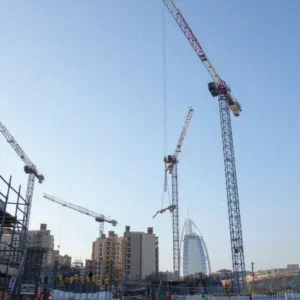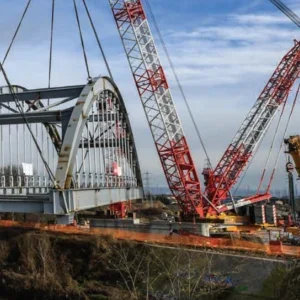Tractors India Limited’s existing 275,000 sq ft factory in Kolkata, India, has its roots in the company’s 1944 deal to distribute cranes made by British manufacturer Coles. As sole Indian distributor for Coles, TIL sold hundreds of 5t–40t diesel electric lattice boom cranes. The business was boosted by the Indian government’s infrastructure building programmes in the two decades following the country’s independence.
The distribution arrangement with Coles was converted into a technical collaboration for manufacturing cranes in India in 1962. TIL introduced diesel hydraulic telescopic boom cranes in 1979. Starting with a 20t model, the range was expanded to 100t.
TIL was the sole manufacturer of cranes in India until 1980, when the Indian government lifted protectionist trade policies. When Coles was purchased by Grove in 1994, TIL changed its collaboration from Coles UK to Grove USA. It updated its entire range of cranes up to 75t with models based on Grove designs.
TIL currently makes lifting equipment from 12t–75t capacity, including industrial cranes, truck mounted cranes, rough terrain cranes, lorry loaders, reach stackers, electrical level luffing cranes and rubber tyred gantry cranes. It makes 200 mobile cranes per year.
Under the technical collaboration deal with Grove (now owned by Manitowoc), TIL receives design, drawings and calculations for each model. TIL modifies these designs to suit local requirements and local vendors’ capabilities. The design changes are then approved by Grove. Grove also makes available to TIL components such as filters, motors, valves, adapters, tube kit and oil coolers.
TIL vice-chairman and CEO Sumit Mazumder says, “[We want] to offer quality products at a competitive price and retain our market share in the mobile crane market, which we estimate at 60%. We emphasise product indigenisation, by undertaking product reengineering and through sustained support for our research and development wing. Indigenisation has been done in key components. Along with other design modifications, this allows TIL to pass cost benefits to its customers.”
The company makes six models of rough terrain crane, including 20t, 30t and 75t capacity machines. TIL is planning to update its 40t, 55t and 75t rough terrain cranes over the next 18 months, with a new 40-tonner due in September 2009, says president S K Bhatnagar.
In addition to its relationship with Manitowoc, TIL is collaborating with Paceco Corp of the USA (a subsidiary of Japan’s Mitsui Engineering and Shipbuilding) to produce rubber tyred gantry cranes, and with Famak of Poland to build electric level luffing cranes for bulk material handling equipment, for Indian ports. The cranes built under these deals will be manufactured at the new plant.
The plant is equipped with plasma cutting machines and advanced welding technologies to manufacture components. The plant fabricates structural components for cranes (including carrier frames, turn tables, booms), while engines, axles and other components are sourced from external sources and assembled.
TIL buys transmissions from Dana in Europe, and axles from Axletec in the US or Kessler in Germany. Key hydraulic components like valves, pumps and motors are sourced from Rexroth and Parker, USA. Slew bearings come from Germany, and gearboxes are bought from manufacturers based in Europe and the USA.
Big plans
“The massive growth in opportunities arising out of demand from greenfield and brownfield core and industrial construction projects (including port and refinery projects) in India, makes it imperative for us to expand our facilities. Our existing plant has reached a saturation point,” says Mazumder. He adds, “The expansion, aided by creation of a new plant, would further consolidate our market position as it would enable us to offer numerous products.”
The company is now planning a new INR 200bn ($4.1m) factory site measuring 800,000 sq m in its first phase, near Kolkata. The new facility will increase the number of units the material handling group can build by four times as much. It would make mobile cranes, coal cargo handling systems, rubber-tyred gantry cranes, electric level luffing cranes and reach stackers at the new factory. Production from the new plant is expected to commence in mid 2009.
The company plans to use the plant to not only make cranes and port equipment for the Indian market, but also to get into manufacturing components for export.
“We would look to utilise our new facility both as a production hub for new products for the Indian market and also to promote value based on our strong engineering skills by supplying critical components to crane manufacturers in Europe,” Bhatnagar says.
When asked what these components might include, Bhatnagar says, “Depending on the type of equipment, it could be booms, frames, castings and forgings. These types of components are of greatest interest outside of India. We have more than 40 years’ experience manufacturing similar components through our licence agreement.”
Bhatnagar said that as an Indian firm, TIL has certain competitive advantages over the many steel fabrication companies in China. He contends that, compared to China, India has much higher skills of people required to do high strength steel structural fabrication. And because of India’s colonial links with England, it has greater fluency in English. “Any global associate outside of India would find it convenient at all levels in the organisation to deal with TIL in English,” he says.
Local service
As well as building cranes and components, for itself and for foreign customers, TIL still has a substantial distribution and service business. It is the sole Indian distributor for many Manitowoc crane types, and has agreements with other foreign manufacturers including Hyster and Caterpillar. It has five main component warehouses in Delhi, Chennai, Mumbai, Jammnagar and Kolkata, and 26 service depots.
TIL has a marketing collaboration agreement with Manitowoc crawler cranes in India. Under the agreement TIL offers 17 models of crawler crane from 80t–900t.
Bhatnagar says, “There is a growing demand for crawler cranes in India, at the capacity range of 75t–600t; at least 30% of this demand is from refinery and core construction projects. Since India does not manufacture cranes above 75t capacity, they have to be sourced globally through tie-ups.”
TIL is also the Indian distributor of Grove’s 30t–120t rough terrain cranes, 35t–450t all terrains and 40t–75t truck mounted cranes. TIL also distributes Manitowoc’s Yard Boss and Shuttlelift industrial cranes in India.
TIL recently forged an exclusive marketing alliance with Hyster, of the USA, to distribute its products in India, Nepal and Bhutan. Under the deal , TIL will market Hyster’s high capacity fork lift trucks, empty container handlers, laden container handlers and reach stackers.
Mazumder says, “The relationship with Hyster will be a significant step for TIL to accelerate the company’s growth in the business of providing material handling solutions. There is a significant opportunity for growth of big trucks, forklifts and container handler markets in India and neighbouring countries. Under this new partnership, we will significantly increase the depth and breadth of our.”
Headquartered at Kolkata, TIL’s service network, has a qualified team of 100 engineers spread across 26 locations across India. Its five component warehouses have a total stock of spare parts exceeding 75,000 items.






